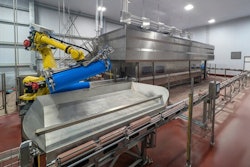Stampede Culinary Partners has announced new Low-Temperature Processing (LTP) technology, which was developed to enhance pasteurization outcomes without compromising product quality. Stampede says its LTP process mirrors the pathogen reduction efficacy of High-Pressure Pasteurization (HPP) while “addressing the limitations that challenge traditional approaches.”
"Our LTP technology represents a major step forward in food safety and quality for the fully cooked meat and meal industry," says Brock Furlong, CEO and President of Stampede Culinary Partners. "We're able to deliver products that are not only safer but maintain exceptional flavor, texture, and shelf life. This innovation underscores our commitment to setting new standards of safety in the industry and providing our customers with the best possible products."
According to the U.S. Department of Agriculture's Food Safety and Inspection Service (FSIS), pasteurization must achieve a minimum 5-log reduction of pathogens such as Salmonella, E-Coli and Listeria monocytogenes in ready-to-eat (RTE) meat and meal products. According to a statement issued by the company, “While HPP is a validated and effective method, it presents several drawbacks that can impact product integrity and efficacy. Stampede's LTP innovation offers a cutting-edge alternative designed to overcome these obstacles.”
Advantages of LTP
Stampede says that its research highlighted “key challenges with HPP, including limited efficacy against psychrophiles (cold-loving microbes), potential impact on product color and texture, and risks to packaging integrity.” The LTP technology developed by Stampede was designed to achieve FSIS-defined pasteurization with enhanced efficacy and “fewer drawbacks.”
Key features of the LTP process include:
- Vacuum Sealed Safety: LTP is performed in the final, vacuum-sealed packaging, ensuring product safety and integrity throughout the pasteurization process.
- Humidity-Controlled Precision: The product is exposed to 100% humidity in an enclosed cabinet and gradually heated to a temperature of 132°F for a minimum of 80 minutes, meeting the FSIS Appendix A cooking guidelines for pathogen reduction.
- Enhanced Efficacy: Over 30 products have already been validated through Stampede's LTP process, achieving a proven 5-log reduction in pathogens. Each product undergoes rigorous testing to meet Stampede's exacting standards.
- Longer Shelf Life: On all 30 product validations, shelf-life exceeded benchmarks for HPP processed products.
Stampede says that, unlike standard approaches, its LTP does more than ensure microbial safety; it extends the shelf life of refrigerated meats and meals to between 90 and 180 days based on taste and texture, not solely microbial growth. This approach prioritizes flavor consistency and consumer satisfaction while maintaining safety standards, says the company.




















